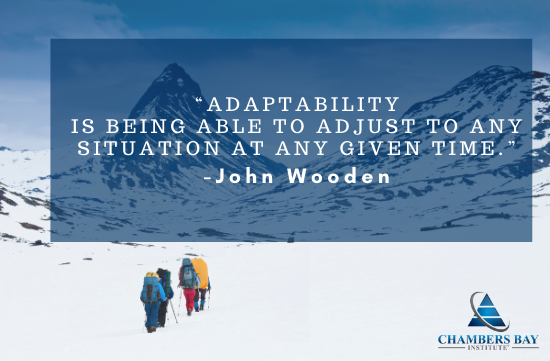Closing the “Adaption Gap”
Thrive in Today’s VUCA World

by Jim Solomon and Bruce LaRue, Ph.D.
How prepared are you and your organization to adapt to unforeseen circumstances? “As British historian Michael Howard once famously said about [military] doctrine, it does not matter if the military gets it wrong. Instead, what matters is the “capacity to get it right quickly when the moment arrives.” In the private or non-profit sectors, replace “military” with “your organization”. Can you and your team “get it right quickly”?
We suggest that Integrator Leaders routinely seek ways to minimize the “adaption gap”, especially when facing change or ambiguity. The result is often why some organizations are successful while others are not. Integrator Leaders are guided by 6-principles that have been found to move them beyond just survival, allowing them to thrive in a volatile and uncertain world.
The leader’s need to be adaptable and to lead change has become so pervasive, especially during this period of the COVID-19 pandemic, that simply to survive means that we must learn to leverage change to our advantage by building organizations that are more adaptive, agile, creative, and innovative.

How we respond to change is ultimately a choice. We can see change as a threat to be avoided or a challenge to be overcome. We can choose to be a victim to our circumstance, or we can learn to leverage change to our advantage. The key is to never surrender our ability to choose how we respond to our situation. This is the essence of how humans adapt, develop, and evolve, and it is what distinguishes us from nearly every other creature on this planet.
VUCA (Volatility, Uncertainty, Complexity, and Ambiguity),” means that our previous notions of predictability and control no longer apply. Small changes in a VUCA world can generate effects that intensify in unpredictable ways over space and time. Our world is far more volatile and uncertain than ever, driven primarily by unprecedented levels of interdependence and rapid change among actors and events. Small changes in such a complex system can cause ripple effects that amplify unpredictably over space and time, and often at dizzying speeds. Increased ambiguity makes it difficult, if not impossible, to project future outcomes based on past trends. More than ever, leaders must enhance their ability to adapt to thrive in a VUCA world.
» Can the challenges you face also pose hidden opportunities for change and transformation?
» Can your workforce adapt enough to get by, even if the C-Suite has fallen into the “adaption gap”?
» What if C-Suite leaders learn to see through the eyes of their customers, their organization, and their team?
» And what if these leaders extensively use their workers as their operational advisors?
» Could your organization thrive during challenging times if your leaders, at all levels, applied the Principles that Guide the Integrator Leader?
“Leadership is about leading change; everything else is management. “
Adapted from: “Seeing What isn’t There – A Leader’s Guide to Creating Change in a Complex World” by Bruce LaRue, Ph.D. and Jim Solomon. Deeds Publishing, Atlanta.

You must be logged in to post a comment.